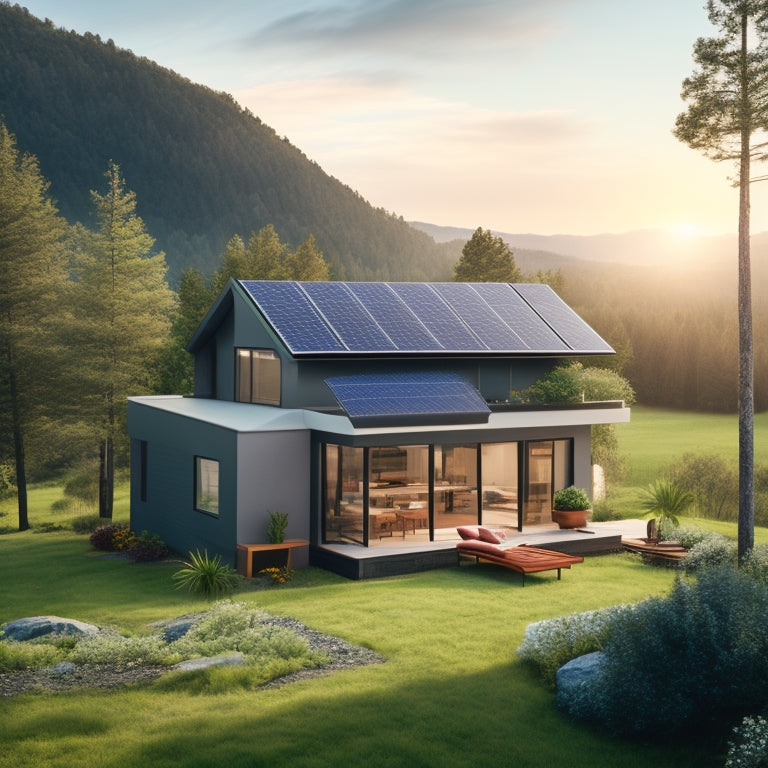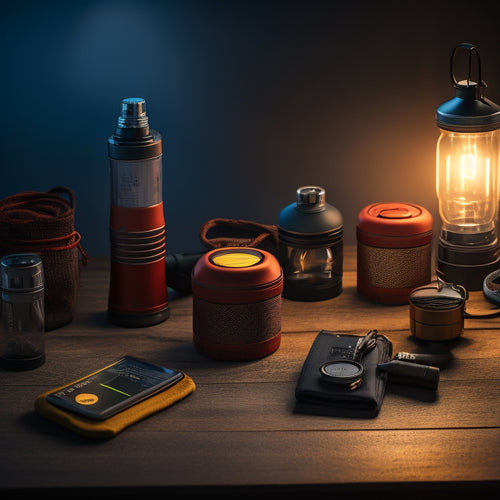
Power Your Home Off the Grid Successfully
Share
To power your home off the grid successfully, you'll need to carefully select and integrate high-efficiency solar panels, energy storage systems, and inverters. Top solar panel brands like Renogy, SunPower, and LG offer reliable options. Energy storage options include lithium batteries, hybrid systems, and lead-acid batteries, each with its own strengths and weaknesses. Inverters convert DC power to usable AC power, and hybrid systems require specific inverters to manage solar and generator power. By considering these components and your unique energy needs, you can create a reliable and efficient off-grid power system - and exploring real-world case studies can provide beneficial perspectives to help you get it right.
Key Takeaways
- Choose high-efficiency solar panels from reputable brands like SunPower, Panasonic, and LG to maximize energy harvest.
- Select energy storage options like lithium batteries or hybrid systems based on your energy needs and budget.
- Ensure inverter compatibility with your energy storage and other system components to optimize performance.
- Accurately assess your energy requirements to correctly size your solar panel array and backup generator.
- Consider real-world case studies to understand practical applications and unique challenges of off-grid solar systems.
Top Solar Panel Brands Reviewed
When evaluating a solar panel system, the brand you choose can greatly impact your energy independence and savings.
You'll want to select a brand that offers high solar panel efficiency, guaranteeing you maximize your energy production. Look for brands with high-efficiency panels, typically above 20%. Renogy, for instance, is known for its monocrystalline panels with high efficiency rates high-efficiency solar panels.
Additionally, take into account installation considerations, such as the panel's durability, warranty, and compatibility with your roof type. Top brands like SunPower, Panasonic, and LG offer high-efficiency panels with excellent warranties.
Other factors to think about include the brand's reputation, customer service, and certification. By choosing a reputable brand, you can secure a reliable and efficient solar panel system that meets your energy needs.
Research and compare top brands to find the best fit for your off-grid energy goals.
Energy Storage System Options
Energy Storage System Options
Three key components make up an all-encompassing off-grid solar system: solar panels, a charge controller, and an energy storage system. When it comes to energy storage, you have several options to evaluate.
- Lithium Batteries: Known for their high energy efficiency and long lifespan, lithium batteries are a popular choice for off-grid systems. They offer high storage capacity and can be paired with solar generators for a reliable backup solution.
When assessing energy storage options, it's crucial to examine factors such as depth of discharge and cycle life to verify the chosen solution meets your energy needs.
- Hybrid Systems: These systems combine different battery types, such as lithium and lead-acid, to optimize energy efficiency and storage capacity.
Hybrid systems often require advanced battery management systems to guarantee seamless operation.
- Lead-Acid Batteries: A cost-effective option, lead-acid batteries are a common choice for off-grid systems.
While they may not offer the same performance as lithium batteries, they can still provide reliable backup power with proper installation and maintenance.
Evaluate installation costs and battery management requirements when selecting your energy storage system.
Off-Grid Inverter Technologies
Your off-grid solar system's brain, the inverter, plays a critical role in converting DC power from your energy storage system into usable AC power for your home.
When selecting an inverter, consider inverter efficiency, as it directly affects your system's overall performance. To guarantee ideal energy conversion, look for inverters with high peak efficiency ratings, typically above 98% high peak efficiency, and check efficiency ratings for effective DC to AC conversion.
Hybrid systems, which combine solar and generator power, require specific inverter types that can handle both sources. There are several inverter types, including pure sine wave, modified sine wave, and square wave, each with its own advantages and disadvantages.
During installation, verify the inverter is compatible with your energy storage system and other components. Proper installation tips include following the manufacturer's instructions and considering factors like temperature, humidity, and ventilation.
Essential System Components Checklist
Selecting the right off-grid solar system components is essential to guaranteeing a reliable and efficient power supply.
You'll need to carefully consider each element to guarantee seamless integration and peak performance.
-
Solar Panel Sizing: Accurately size your solar panel array to meet your energy demands, factoring in elements like roof size, shading, and local solar irradiance.
-
Backup Generator Options: Choose a suitable backup generator that can efficiently provide power during periods of low solar production or high energy demand.
-
Deep-Cycle Batteries: Select high-quality deep-cycle batteries designed for off-grid systems, capable of storing excess energy generated during the day for use at night or during power outages.
Real-World User Experience Case Studies
As you immerse yourself in the world of off-grid solar systems, it's essential to look beyond the theoretical and investigate how these systems perform in real-world scenarios.
You'll want to examine user experiences, where homeowners have successfully powered their homes off the grid, overcoming unique challenges. A remote cabin in Colorado, for instance, relied on a hybrid system combining solar and wind power to overcome seasonal variations in energy production.
Meanwhile, a farmhouse in rural Texas utilized a battery bank to address frequent grid outages.
Frequently Asked Questions
How Do I Handle Excessive Energy Production During Peak Sun Hours?
During peak sun hours, you'll face excessive energy production. You're wise to weigh energy storage solutions and implement load management strategies to optimize your system's efficiency, ensuring you don't waste excess energy and maximize your renewable resources.
Can I Use My Existing Electrical Panel With Off-Grid Systems?
Did you know that 75% of US homes have sufficient roof space for solar panels? When integrating off-grid systems, you'll face existing panel compatibility and off-grid integration challenges; however, you can likely use your existing electrical panel with some modifications and professional assessment.
Are Off-Grid Systems More Prone to Electrical Fires?
You're right to worry about electrical fires with off-grid systems, but proper fire prevention and safety measures can minimize risks; make certain your system is designed and installed by a certified professional, and follow regular maintenance schedules to reduce the likelihood of fires.
How Often Should I Inspect and Maintain My Off-Grid System?
Imagine your off-grid system as a finely-tuned machine; neglect it, and it'll rust away. You should inspect and maintain it regularly to guarantee system longevity. Create a maintenance schedule to check batteries, inverters, and connections every 3-6 months to prevent issues.
Can I Sell Excess Energy Back to the Grid With Off-Grid Systems?
You can sell excess energy back to the grid with off-grid systems, utilizing net metering options, which require energy storage solutions to store surplus energy generated and feed it back into the grid when needed.
Related Posts
-

Best Solar Powered Flashlights for Emergency Situations
When you're choosing the best solar-powered flashlights for emergency situations, focus on their brightness, battery ...
-

Designing a Green Roof for Maximum Energy Efficiency
Designing a green roof for maximum energy efficiency involves several key strategies. Start by selecting native, drou...
-

Top Solar Powered Camping Fans for Camping Enthusiasts
If you're a camping enthusiast, a solar-powered fan can be a transformative element for your outdoor experience. Thes...


